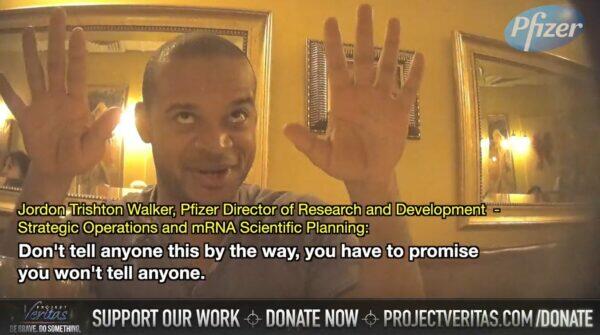
Facebook and Instagram have threatened to restrict or ban Project Veritas from their platforms, both owned by Meta, after a journalist confronted a senior YouTube official about the removal of a video about Pfizer’s intention to mutate the COVID virus.
On Friday, the nonprofit journalism organization Project Veritas published footage that appears to show one of its reporters confronting YouTube’s vice president of Global Trust and Safety, Matt Halprin.
The video shows the reporter approaching Halprin in public regarding YouTube’s removal of a video featuring a senior Pfizer official, unaware he was being recorded, discussing how the company is considering mutating the COVID-19 virus to develop new vaccines proactively.
Halprin refused to answer the reporter’s inquiries and instead told the reporter not to touch him while also threatening to call the police, before walking away.
“YouTube took down our Pfizer exposé. YouTube gave us a strike and will not let us post for a week,” said James O’Keefe, head of Project Veritas, in a video.
Facebook and Instagram warned Project Veritas that its video of Halprin violates “Community Standards.”
“We have these standards because we want everyone to feel safe, respected, and welcome,” the warning said. “If your content goes against our Community Standards again, your account may be restricted or disabled.”
Project Veritas also announced Friday that it had been “wrongfully locked out” of its Twitter account for two hours over a post that featured the video of one of its journalists questioning Halprin. The organization said it received a warning from Twitter that the post was “abuse and harassment.”
Twitter later apologized for the move, calling it an “error,” according to a screenshot shared by O’Keefe.
Halprin appeared to be out for a walk or run on a suburban street when he was confronted by Project Veritas journalist Christian Hartsock.
When Hartsock introduced himself as a reporter from Project Veritas, Halprin immediately seemed to recognize the organization and quickly walked away.
“Why did you ban our videotape of a Pfizer director talking about mutating viruses?” Hartsock asked, following Halprin. “How much is Pfizer paying you to run cover for them? Is YouTube brought to us by Pfizer?” he added, getting no responses.
Halprin, who was dressed in a hooded sweatshirt, pulled the hood over his mouth.
“Matt, you’re the global head of trust and safety at YouTube. Why don’t you trust the public with a matter that absolutely concerns their safety?” Hartsock asked.
Hartsock told Halprin that millions would see this interview and “your cowardice,” challenging him to “be brave” and answer some of the questions. Halprin batted away the microphone, remaining silent.
“They’re going to see your absolute contempt for the public trust and they’re going to see your absolute disregard for public safety. Are you sure this is how you wish to portray yourself?” Hartsock asked while walking alongside Halprin.
Hartsock asked Halprin if he knows how much ad revenue YouTube takes in from Pfizer. “How much was at stake?” he asked.
“A Pfizer director talking about mutating viruses, and you don’t want the American public or the world to know about it. Why not?” Hartsock asked, following the question up by asking if Halprin has “any ethical responsibility” to people all around the world.
“Why does the public not deserve to see that videotape?” Hartsock asked.
Halprin remained silent throughout the inquiries, only speaking at one point to say: “You touched me. That’s not something you want to do.” Hartsock asked if that was a threat, to which Halprin responded: “No. I just said I’d call the police if you accost me.”
The Project Veritas video that YouTube removed was originally released on Jan. 25. It showed Dr. Jordon Walker, a director of research and development at Pfizer, telling an undercover reporter for Project Veritas that the pharmaceutical company was exploring the idea of mutating COVID-19 to preemptively develop new vaccines.
However, Walker acknowledged the risk and noted that scientists at Pfizer were being cautious in their approach.
“One of the things we’re exploring is like, why don’t we just mutate it ourselves so we could create—preemptively develop new vaccines, right?” Walker said.
“If we’re going to do that though, there’s a risk of like, as you could imagine—no one wants to be having a pharma company mutating [expletive] viruses,” he added.
Walker suggested that the company was proceeding slowly and being controlled, so as not to advertise its intentions and avoid creating an unintended mutation. He also stated his belief that COVID-19 would continue to be a source of revenue for Pfizer.
“Obviously they don’t want to accelerate it too much. I think they are also just trying to do it as an exploratory thing because you obviously don’t want to advertise that you are figuring out future mutations,” Walker said. “You have to be very controlled to make sure that this virus that you mutate doesn’t create something that just goes everywhere. Which, I suspect, is the way that the virus started in Wuhan, to be honest,” he also said, adding that COVID-19 is going to be “a cash cow for us for a while going forward.”
Conclusion: It seems like most people still don’t understand the censorship and manipulative power of the Khazarian criminal syndicate and their 200 000 Sayanim (Khazarian auxiliary agents) in action.


